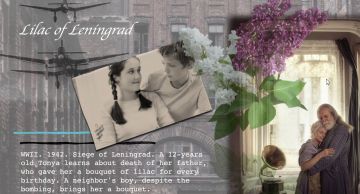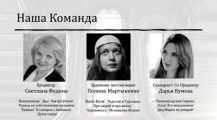Короткометражный фильм «Ленинградская сирень»
Ленинград, 1942 год. В свой день рождения девочка узнаёт о гибели отца, который на каждый день рождения дарил ей сирень. Соседский мальчишка несмотря на бомбёжку приносит ей букет.
https://planeta.ru/campaigns/lilac-of-leningrad
Пару лет назад меня поразили, нет - потрясли слова одного молодого человека, сказанные между прочим, так просто и так страшно обыденно: "Какая странная медаль - "Жителю Блокадного Ленинграда"! Ну жил он там… А медаль-то за что?".
A couple of years ago, I was struck, no, I was shocked by words of one young man, who said by the way, so simply and so terribly ordinary: "What a strange medal -" To a resident of Besieged Leningrad!" Well, he lived there ... But what was the medal for?".
Эти слова снова и снова возникали в моей памяти, царапали, не давали покоя… И я поняла – мне надо снять фильм о ленинградцах тех страшных блокадных лет. Я стала искать сценарий не о войне, не о смерти и ужасах. Я хотела создать фильм о людях. Сценарий Дарьи Кумовой "Ленинградская Сирень" поразил меня своим искренним рассказом о любви и силе человеческого духа, и я считаю, что этот фильм нужно снять именно сейчас.
These words again and again arose in my memory, scratched, haunted ... And I realized - I need to make a film about the peope who lived in Leningrad in those terrible years of siege. I began to look for a script not about war, not about death and horror. I wanted to make a film about people. The screenplay of Daria Kumova "Lilac of Leningrad " struck me with its sincere story about love and the strength of the human spirit, and I believe that this film should be made right now.
Блокада Ленинграда — длительная военная блокада, предпринятая с юга группой армий «Север» нацистской Германии против города Ленинграда (ныне Санкт-Петербург) на Восточном фронте во время Второй мировой войны. Блокада длилась 872 дня!
The Siege of Leningrad was a prolonged military blockade undertaken from the south by the Army Group North of Nazi Germany against the city of Leningrad (now Saint Petersburg) on the Eastern Front during World War II. It lasted 872 days!
Я - режиссер и продюсер, являюсь автором пяти короткометражных фильмов, нескольких музыкальных клипов, победителем и участником более 30 международных кинофестивалей. Живу в Санкт-Петербурге, зовут меня Наташа Фисяк. У меня есть проверенная в деле профессиональная команда. Мы умеем не только снимать кино, но и доносить его до зрителя, устраивать показы для школьников и молодежи, продвигать на фестивали как российские, так и зарубежные. А после фестивальной жизни мы обязательно выложим фильм в интернет для свободного просмотра.
I am film director and producer, author of five short films, several music videos, winner and participant of more than 30 international film festivals. I live in St. Petersburg and my name is Natasha Fissiak. I have a great professional team of fimmakers. We know how to shoot films and can bring them to the audience, arrange screenings for schoolchildren and youth, and promote them to both Russian and foreign festivals. And after the festival life, we will definitely put the film on the Internet for free viewing.
О фильме: Наша история происходит во время Блокады Ленинграда. Но она не о боевых действиях, а о человеческих чувствах и о маленьком рыцаре. О первой любви, которая зародилась в суровое время и продлилась всю жизнь.
About the film: Our story takes place during the Siege of Leningrad. But it is not about fighting, but about human feelings and about a little knight. About the first love that was born during harsh war time and lasted a lifetime.
Мы хотим показать маленький подвиг - один из тех, которые не имеют значения для военных побед, но из которых сложилась большая победа духа ленинградцев. Сейчас, когда всё чаще предпринимаются попытки пересмотра итогов Второй Мировой войны молодыми людьми, особенно важно понимание сути нашей Победы - победы не столько оружия, сколько духа. И мальчик, под бомбами бегущий за веткой сирени, здесь так же важен, как идущий в атаку солдат. Потому что это - готовность рисковать собой ради того, кто рядом. И это тоже проявление героизма. Такая внутренняя сила поколения победителей - это наше наследие, часть нашей национальной идентичности. Через мелодраматическую историю первой любви эта тема найдёт эмоциональный отклик у молодого зрителя.
We want to show a small act of bravery - one of those that do not matter for military victories, but from which a great victory of the spirit of people of Leningrad was formed. Now, when more and more attempts are being made by young people to revise the results of the Second World War, it is especially important to understand the essence of our Victory - a victory not so much in weapons as in spirit. And the boy running to get a lilac twig under the bombs is just as important here as the soldier going to the attack. Because it is the willingness to risk oneself for the sake of someone who is nearby. And this is also a manifestation of heroism. This inner strength of the generation of winners is our heritage, part of our identity. Through the melodramatic story of first love, this theme will find an emotional response from a young viewer.
О том, как Ленинград перенёс Блокаду говорят "город выжил, потому что город жил": работали школы, театры, люди старались защитить памятники архитектуры, как могли поддерживали культуру быта и отмечали праздники, сосед помогал соседу. Сейчас часто стараются обнажить неприглядные страницы Блокады, такие как мародёрство и прочие, ещё более страшные вещи. Но будь такие явления массовыми, город не выдержал бы эти 872 страшных дня. Когда мы говорим, что гордимся мужеством жителей блокадного Ленинграда, то восхищаемся тем, как в нечеловеческих условиях они оставались людьми. Наш маленький герой Серёжа иллюстрирует именно это. Человечное стремление поддержать девочку, которой сейчас очень плохо, побеждает в нём животный и такой естественный страх смерти. Такими мы хотим показать людей блокадного Ленинграда, потому что такими они были, и этим нужно гордиться!
How did Leningrad endure the Seige? Stories are told that "the city survived because the city lived": schools, theaters were open, people tried to protect architectural monuments, they supported the culture of everyday life and celebrated holidays as much as they could, the neighbor helped the neighbor.
Now people often try to expose only the unsightly pages of the Siege, such as looting and other, even more terrible things. But if such phenomena were widespread, the city would not have survived these 872 terrible days. When we say that we are proud of the courage of the inhabitants of besieged Leningrad, we admire how they remained people in inhuman conditions. Our little hero Seryozha illustrates exactly this. The human desire to support the girl, who just lost her father, takes over the natural fear of death. This is how we want to show the people of besieged Leningrad, because they were this way, and we should be proud of them!
Краткий синопсис: Соседи по коммунальной квартире за скудным столом празднуют двенадцатилетие девочки Тони. Среди гостей соседский мальчик Серёжа, ровесник Тони. Именинница ждёт письма от папы с фронта. Этот праздник для них двоих особенный - по традиции папа всегда приносил Тоне на день рождения букет сирени, поэтому сегодня она особенно тоскует по нему.
Brief synopsis: The neighbors in a communal apartment are celebrating the twelfth birthday of the girl Tonya at a meager table. Among the guests is the neighbor's boy Seryozha, the same age as Tonya. The birthday girl is waiting for a letter from her dad from the war. This holiday is special for the two of them - according to tradition, dad always brought a bouquet of lilacs to Tonya for her birthday, so today she especially misses him.
Но вместо долгожданного письма приходит похоронка на папу. Слезы Тони и ее мамы прерывает вой воздушной тревоги – сейчас будет бомбёжка. Все бегут в бомбоубежище. Но Серёжа убегает совсем в другую сторону. Снаружи гремят взрывы. Все боятся, что Серёжа погиб. А мы видим, как он подбегает к кусту сирени. Но тут раздаётся взрыв, и экран гаснет. После налёта все бегут искать Серёжу, его мать сходит с ума. А он вылезает из подвала живой и здоровый и достаёт из-под куртки веточку сирени для заплаканной Тони. Несмотря на все ужасы войны она все-таки получила свой букет сирени на день рожденья. Уже не от папы, а от своего маленького рыцаря.
But instead of the long-awaited letter comes a letter stating that her dad died. The tears of Tonya and her mother are interrupted by the howl of an air raid - now there will be a bombing. Everyone runs to the bomb shelter. But Seryozha runs away in a completely different direction. There are explosions outside. Everyone is afraid that Seryozha is dead. And we see how he runs up to the lilac bush. But then there is an explosion, and the screen goes blank. After the raid, everyone runs to look for Seryozha, his mother goes crazy. And he crawls out of the basement alive and well and takes out a sprig of lilacs from under his jacket for the tearful Tonya. Despite all the horrors of the war, she still received her bouquet of lilacs for her birthday. No longer from dad, but from her little knight.
Голос пожилой женщины за кадром рассказывает: «В ту самую минуту я и влюбилась в вашего дедушку Серёжу». Мы переносимся в начало 2000-х. Тоня – уже старенькая бабушка, она празднует свой день рождения с детьми и внуками. Стол ломится от угощения. Бабушка Тоня с маленькой внучкой стоят у окна и видят, как дедушка Серёжа идёт домой с огромным букетом сирени. Так детская любовь, зародившаяся в страшное блокадное время, прожила много лет. И на каждый Тонин день рождения Сережа дарил ей большой букет сирени, как в её детстве делал погибший на войне папа.
The voice of an elderly womаn says: “At that very moment I fell in love with your grandfather Seryozha.” We are transported to the early 2000s. Tonya is already an old grandmother, she celebrates her birthday with her children and grandchildren. The table is bursting with food. Grandmother Tonya with her little granddaughter are standing at the same window and they see how grandfather Seryozha is waking toward the house with a huge bouquet of lilacs. So the children's love, born in the terrible time of the siege, lived for many years. And for each Tonya's birthday, Seryozha gave her a large bouquet of lilacs, as her father, who died in the war, did in her childhood.
Аудитория: История будет близка и понятна любому человеку. Но целевая аудитория - молодое поколение.
Audience: The story will be dear and understandable to any person. But the target audience is younger generation.
Актуальность: Говорят, что тяжёлые времена рождают сильных людей, сильные люди создают хорошие времена, а хорошие времена рождают слабых людей. В самые тяжёлые времена наши бабушки и дедушки умели поддержать того, кто рядом. Я думаю, что равняясь на них, мы - наследники Победы можем стать такими же сильными людьми.
Relevance: They say hard times make strong people, strong people make good times, and good times make weak people. In the most difficult times, our grandparents knew how to support those who were nearby. I think that by looking up to them, we, the heirs of the Victory, can become the same strong people.
Сьемки:
Сьемки планиуются на первую неделю июня 2022 года, постпродакшен начнется после окончания съёмок и осенью фильм начнет свой фестивальный путь.
Filming:
Filming is scheduled for the first week of June 2022, post-production will begin after filming is completed and the film will begin its festival journey in the fall.
Огромное спасибо за ваше время и поддежку!!! Thank you very much for your time and support!
Короткометражный фильм «Ленинградская сирень»
17.02.2022
Короткометражный фильм «Ленинградская сирень»


